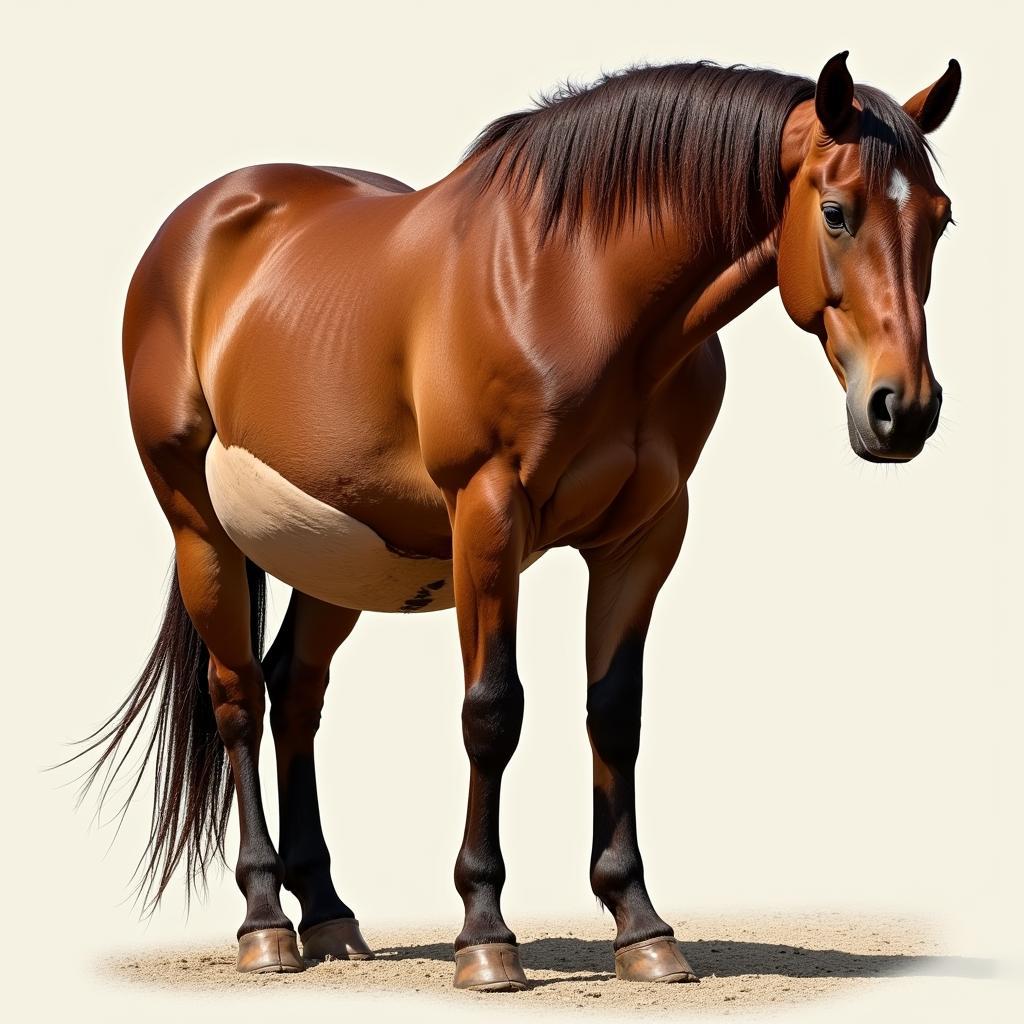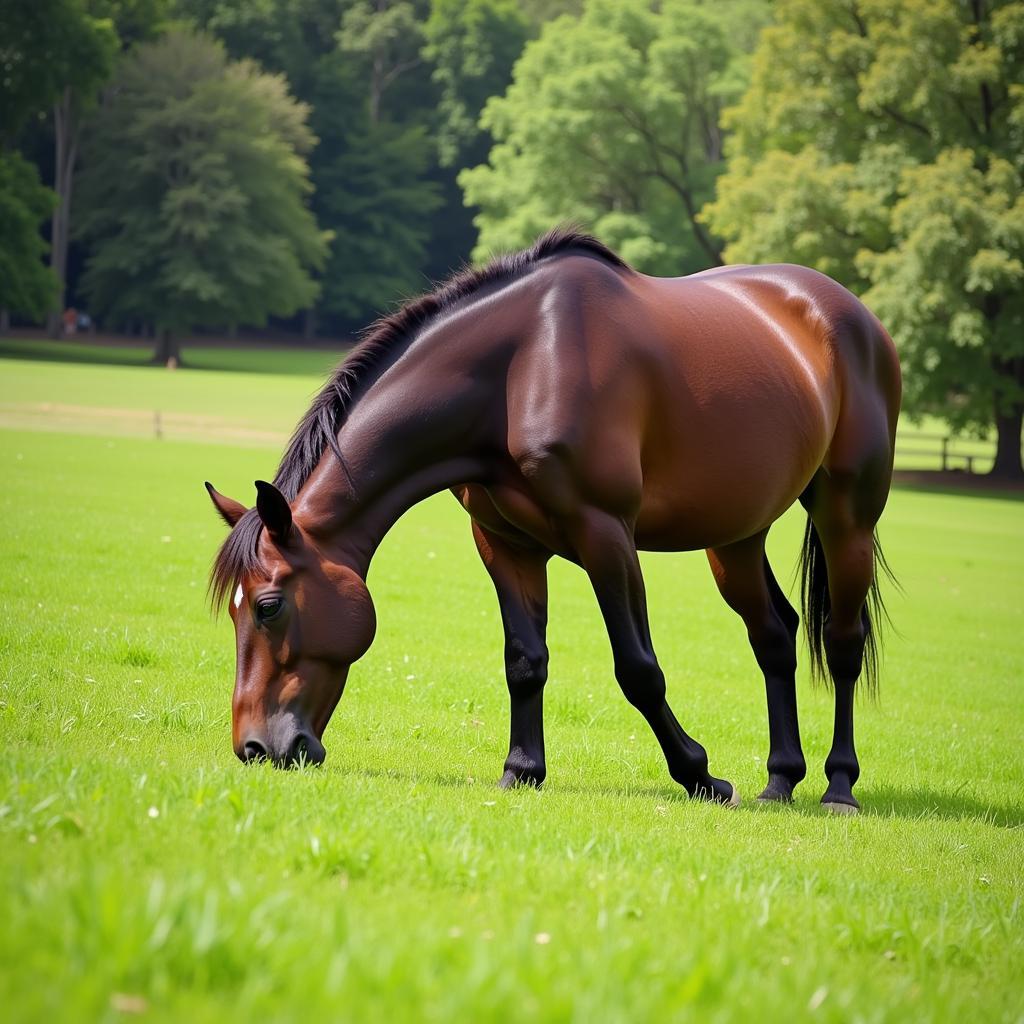A bloated stomach in horses, also known as equine abdominal distension, is a serious condition that requires immediate veterinary attention. It can be caused by a variety of factors, ranging from simple gas buildup to life-threatening intestinal blockages. Understanding the causes, symptoms, and treatment options for a Horse Bloated Stomach is crucial for any horse owner.
Understanding Equine Bloat
 Horse showing signs of a bloated stomach
Horse showing signs of a bloated stomach
Unlike humans and other animals, horses cannot vomit to relieve pressure in their stomachs. This makes bloat a potentially life-threatening situation as gas and fluid continue to build up, putting pressure on vital organs.
Common Causes of a Bloated Stomach in Horses
Several factors can contribute to a horse developing a bloated stomach:
- Gas Buildup: The most common cause, often resulting from rapid changes in diet, overeating grain, or consuming moldy or fermented feed.
- Intestinal Obstruction: Blockages in the intestines caused by foreign objects, parasites, or intestinal displacement can lead to severe bloat.
- Intestinal Torsion: This life-threatening condition involves twisting of the intestines, cutting off blood supply and causing rapid bloat.
- Colic: While not all types of colic cause bloat, some forms can lead to gas buildup and abdominal distension.
Recognizing the Warning Signs
Early detection is critical when dealing with bloat in horses. Be vigilant for the following symptoms:
- Visible abdominal distension: The horse’s stomach will appear larger than normal, particularly on the left side.
- Restlessness and discomfort: The horse may pace, paw the ground, or repeatedly lie down and get up.
- Rolling: Horses may attempt to roll to alleviate the pain and pressure, but excessive rolling can worsen the condition.
- Lack of appetite: A bloated horse will often refuse food and may show signs of dehydration.
- Reduced or absent gut sounds: Listen for the normal gurgling sounds of digestion; their absence can indicate a serious problem.
When to Call the Vet
A bloated stomach in horses is an emergency. If you suspect your horse is experiencing bloat, immediately contact your veterinarian.
“Time is of the essence when dealing with a suspected case of bloat,” says Dr. Emily Carter, an equine veterinarian with over 20 years of experience. “The sooner we can diagnose and treat the underlying cause, the better the chances of a positive outcome for the horse.”
Treatment Options for Equine Bloat
Treatment for a bloated stomach will depend on the underlying cause and the severity of the condition. Options may include:
- Passing a stomach tube: This allows for the release of accumulated gas and fluid, providing immediate relief.
- Medications: Pain relief, anti-inflammatories, and medications to stimulate gut motility may be administered.
- Fluid therapy: Intravenous fluids can help correct dehydration and electrolyte imbalances.
- Surgery: In severe cases, such as intestinal torsion or obstruction, surgery may be necessary.
Preventing Bloat in Horses
While not all causes of bloat are preventable, implementing the following measures can significantly reduce the risk:
- Gradual diet changes: Introduce new feeds slowly, especially grain, to allow the horse’s digestive system to adapt.
- Feed small, frequent meals: Avoid large meals that can overload the digestive system.
- Ensure access to fresh water: Dehydration can contribute to digestive issues.
- Regular deworming: Parasites can cause intestinal blockages.
- Dental care: Proper dental maintenance ensures the horse can chew food thoroughly, aiding in digestion.
 Horse grazing safely in a pasture
Horse grazing safely in a pasture
Conclusion
A horse bloated stomach is a serious condition that requires prompt veterinary care. By being aware of the causes, symptoms, and preventive measures, you can help protect your equine companion from this potentially life-threatening ailment. Remember, when it comes to your horse’s health, it’s always better to err on the side of caution and contact your veterinarian immediately if you have any concerns.
Need immediate assistance? Contact Justus Horses USA at 0772127271 or email us at [email protected]. Our team of equine experts is available 24/7 to answer your questions and provide support.
We are located at QGM2+WX2, Vị Trung, Vị Thuỷ, Hậu Giang, Việt Nam.